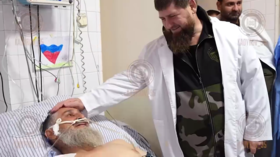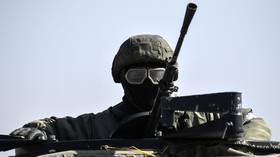Rumored suspect in Russian opposition figure murder wounded in Ukraine

Chechen leader Ramzan Kadyrov posted a video on Tuesday visiting Ruslan Geremeev in hospital. Geremeev is one of the Chechen commanders taking part in the fighting in the Ukrainian city of Mariupol. Currently believed to be recovering from a frontline injury, Geremeev was previously linked by some to the 2015 assassination of liberal politician Boris Nemtsov, although he was never charged with a crime.
“On my way to Mariupol I visited my dear brother and personally saw that he was not in mortal danger. He is on the mend and will soon be back in the ranks,” Kadyrov said on his Telegram account, calling Geremeev “a real soldier and true patriot.”
It was Geremeev’s unit that put up the Chechen flag on the city hall in Mariupol last week, Kadyrov added.
Geremeev has some notoriety among Russian liberal circles, who suspect him of having a hand in the death of Nemtsov. The opposition politician was gunned down in central Moscow in February 2015 while walking across a bridge with his Ukrainian girlfriend.
Five Chechens were sentenced to prison terms for carrying out the hit but the person who commissioned it was never identified. A man named Ruslan Muhudinov as the middleman and organizer of the crime, according to Russian prosecutors and is now on the run. Muhudinov served as a driver in a military unit, in which Geremeev served as deputy commander.
Russian prosecutors sought to interview Geremeev during the investigation, according to a paper trail, but reportedly failed to do so. He was never formally charged with any crime related to the hit.
A lawyer representing Nemtsov’s family claimed that Russia’s Investigative Committee decided against filing an injunction due to shortage of evidence against him.
The US blamed Geremeev for Nemtsov’s death and placed him on the sanctions list in 2019, offering no evidence of his involvement.
Chechen units have taken part in the fighting for Mariupol, a coastal city in southeastern Ukraine which has long been the stronghold of “Azov,” the Ukrainian regiment openly using Nazi insignia.
Moscow attacked its neighbor in late February, following Ukraine’s failure to implement the terms of the Minsk agreements signed in 2014, and Russia’s eventual recognition of the Donbass republics in Donetsk and Lugansk. The German and French brokered protocols had been designed to regularize the status of those regions within the Ukrainian state.
Russia has now demanded that Ukraine officially declare itself a neutral country that will never join the US-led NATO military bloc. Kiev insists the Russian offensive was completely unprovoked and has denied claims it was planning to retake the two republics by force.













